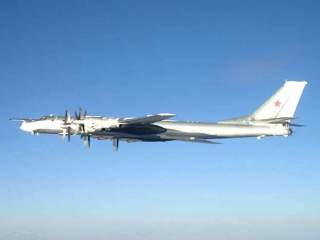Meet What Some Call Russia's Version of the B-52: The Tu-95 Bear
An old, but powerful bomber.
Such patrols, routine during the Cold War, were resumed by Putin in 2007. Although these are theoretically surveillance missions, their main intention is to remind other countries that Russia remains capable of sending nuclear-armed bombers close to their airspace if it chooses to.
Regular flights by U.S. RC-135 spy planes are also known to elicit interceptions by Chinese and Russian fighters. However, the RC-135 cannot carry any weapons.
Of course, the Bear is anything but stealthy and could not survive against modern air- and surface-launched antiaircraft missiles. However, a Bear launching cruise missiles doesn’t have to get close to air defenses in the first place.
In November 2015, fifty-nine years after entering service, the Tu-95 finally saw combat as a bomber. Videos from the Russian Ministry of Defense in the fall of 2015 show them launching cruise missiles that went on to pound the positions of Syrian rebels. Moscow’s first-time deployment of the cruise missiles on air and naval platforms has been interpreted as a means of demonstrating its military capabilities to the world.
The Russian military today maintains a diverse fleet of bombers capable of carrying heavier payloads and flying at faster speeds than the Tu-95. However, the venerable Bear remains well adapted to the job of hauling heavy cruise missiles and keeping a watchful eye over the Pacific and Atlantic—especially when being discreet is not merely unnecessary for the mission, but contrary to its purpose.
Sébastien Roblin holds a Master’s Degree in Conflict Resolution from Georgetown University and served as a university instructor for the Peace Corps in China. He has also worked in education, editing, and refugee resettlement in France and the United States. He currently writes on security and military history for War Is Boring. This would appear in September 2016.
Image: DVIDShub.

